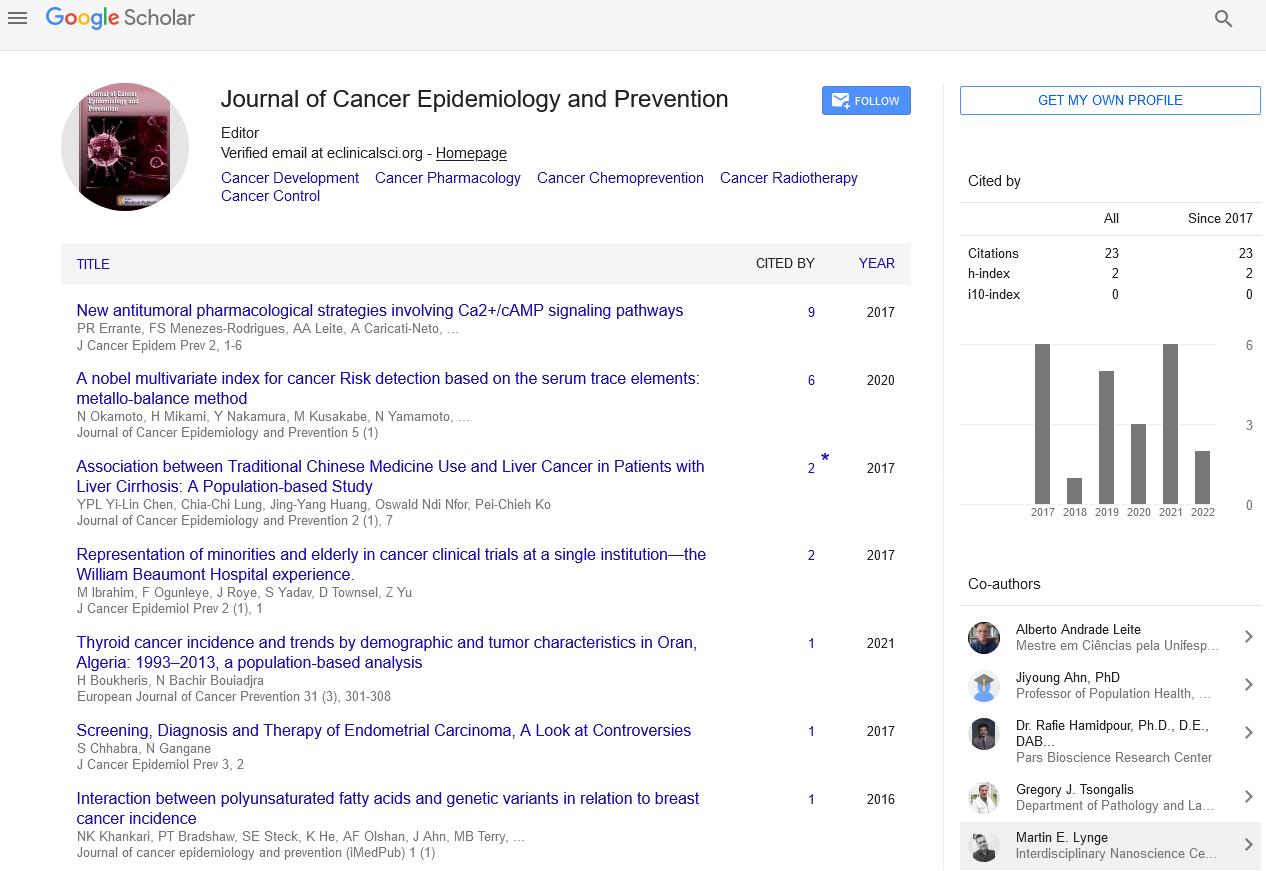Commentary - (2024) Volume 9, Issue 1
Unveiling the Battle Within: Understanding Gut Cancer
Feeri Vint*
Department of Food and Nutrition, University of Sydney, Australia
*Correspondence:
Feeri Vint,
Department of Food and Nutrition, University of Sydney,
Australia,
Email:
Received: 28-Feb-2024, Manuscript No. IPJCEP-24-19747;
Editor assigned: 01-Mar-2024, Pre QC No. IPJCEP-24-19747 (PQ);
Reviewed: 15-Mar-2024, QC No. IPJCEP-24-19747;
Revised: 20-Mar-2024, Manuscript No. IPJCEP-24-19747 (R);
Published:
27-Mar-2024, DOI: 10.36648/IPJCEP.24.09.05
Description
Cancer, a formidable adversary that transcends borders and
affects millions worldwide, manifests in various forms, one
of the most insidious being gut cancer. This silent assailant
strikes the digestive system, targeting vital organs such as the
stomach, intestines, liver, pancreas, and more. Its stealthy
progression often evades early detection, making awareness
and understanding paramount in the fight against it. Gut
cancer encompasses a spectrum of malignancies that arise in
different parts of the gastrointestinal tract. Colorectal cancer,
for instance, develops in the colon or rectum, while gastric
cancer originates in the stomach lining. Likewise, pancreatic
cancer emerges in the pancreas, while liver cancer originates
in the liver cells. Esophageal cancer affects the esophagus,
the tube connecting the throat to the stomach. One of the
most challenging aspects of gut cancer is its ability to progress
stealthily, often without presenting noticeable symptoms
in its early stages. This clandestine nature underscores the
importance of routine screenings and awareness of potential
warning signs. Symptoms may include unexplained weight loss,
persistent abdominal pain, changes in bowel habits, blood in
stool, difficulty swallowing, and jaundice, among others. While
gut cancer can affect anyone, certain factors may increase an
individual’s susceptibility. Lifestyle choices such as smoking,
excessive alcohol consumption, and a diet high in processed
meats and low in fiber can elevate the risk. Additionally, a family
history of gastrointestinal cancers, genetic predispositions,
chronic inflammation of the digestive tract, and conditions like
obesity and diabetes may heighten vulnerability. Prevention
plays a pivotal role in mitigating the risk of gut cancer. Adopting
a balanced diet rich in fruits, vegetables, and whole grains,
while limiting red and processed meats, can promote digestive
health. Regular exercise, smoking cessation, moderation in
alcohol consumption, and maintaining a healthy weight also
contribute to overall well-being and lower the risk of cancer.
Routine screenings, such as colonoscopies and endoscopies, are
instrumental in detecting gut cancers at an early, treatable stage.
These proactive measures can identify precancerous growths
or tumors when they’re most manageable, offering patient’s
better prognoses and treatment options. It’s imperative for
individuals to discuss screening recommendations with their
healthcare providers based on their age, family history, and risk
factors. Treatment approaches for gut cancer vary depending
on factors such as the type and stage of cancer, as well as the
individual’s overall health. Options may include surgery to
remove tumors, chemotherapy, radiation therapy, targeted
therapy, immunotherapy, or a combination of these modalities.
Personalized treatment plans tailored to each patient’s
unique circumstances optimize outcomes and quality of life.
A gut cancer diagnosis can evoke a spectrum of emotions,
ranging from fear and uncertainty to determination and
hope. It’s essential for patients to surround themselves with
a strong support network comprising loved ones, healthcare
professionals, and support groups. Education, advocacy, and
access to resources empower individuals to navigate their
cancer journey with resilience and optimism. Gut cancer is a
formidable adversary, but with awareness, early detection,
and advances in treatment, its impact can be mitigated. By
prioritizing preventive measures, advocating for research,
and fostering a culture of support and compassion, we can
collectively confront this disease and strive towards a future
where gut cancer no longer casts its shadow over lives. In the
battle against gut cancer, knowledge is power, and solidarity
is strength. Let us stand united in our commitment to raising
awareness, supporting those affected, and advancing research
towards a world free from the grip of this relentless foe.
Acknowledgement
None.
Conflict Of Interest
None.
Citation: Vint F (2024) Unveiling the Battle within: Understanding Gut Cancer. J Cancer Epidemiol Prev 9:05.
Copyright: © 2024 Vint F. This is an open-access article distributed under the terms of the Creative Commons Attribution License, which permits unrestricted use, distribution, and reproduction in any medium, provided the original author and source are credited.

